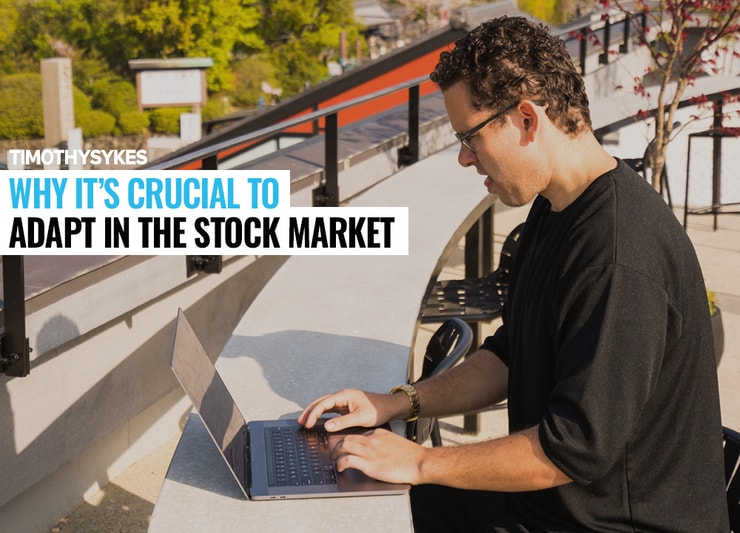This is a very important follow-up to my recent post about SureTrader closing and why it’s crucial to adapt in the stock market.
I don’t know exactly what’s going on with SureTrader. And I haven’t used them since 2015, so I don’t know all the details. But from what I hear, SureTrader clients are getting their money back. So it’s not like a run on a bank.
But several people who remember when I actually used SureTrader almost five years ago have said…
“Oh, you’re such a hypocrite.”
But here’s the thing … I’ve been warning against using off-shore and upstart brokers for the past few years.
Table of Contents
You’ve Had Repeated Warnings About Using Off-Shore Brokers
I would agree with those people … I would say I’m in the wrong if I hadn’t warned for the past few years about off-shore brokers.
I’ve written blog posts warning against using the wrong brokers. On Profit.ly, I’ve talked about brokers in video lessons. I’ve warned students during webinars and at my annual Trader & Investor Summit. (Order your copy of the 2019 TISummit DVD here.)
The warnings have come over, and over, and over again. Like I said in this tweet back in 2016…
@leegeewin see my brokers https://t.co/aXV0YuFayH I don’t use Suretrader anymore
— Timothy Sykes (@timothysykes) January 21, 2016
So, yeah, if I wrote that post the other day saying, “you shouldn’t use off-shore brokers” without any previous warning…
… that would be a problem.
Hindsight Is 20/20
It reminds me of a lot of traders and so-called gurus these days who say, “Look how much money I made!” Then they post a screenshot of a big win. It creates a false sense of what’s possible. People see those posts and think look how easy this is…
But the fake guru didn’t actually talk about the trade when they were in it. They’re just using hindsight. And hindsight is 20/20.
Back to brokers…
Suretrader suspended for 5 days, again, this is why I use https://t.co/Ens8xBEzdW as smaller brokers just aren’t worth the risk, this is the kind of stuff that can happen pic.twitter.com/elQHiKZkbJ
— Timothy Sykes (@timothysykes) September 19, 2019
This is what happens to little brokers. Or prop firms. Or weird hedge funds. That’s why it’s so crucial to adapt in the stock market. And that includes brokers. For more on the brokers I recommend, read this post.
Also, too many people are missing out on the amazing information in “The Complete Penny Stock Course” written by my student, Jamil. (I wrote the forward.) There’s a whole section about brokers (see Chapter I.7, Brokers and Fees, pg. 77).
Focus On Safety
I’d rather have my money in bigger, safer brokers like E-Trade and Interactive Brokers. Again, I don’t get paid by Interactive Brokers or E-Trade. They just suck the least and are safe compared to little brokers. The last time I used SureTrader was roughly half a decade ago.
Look, every year I make a video about which brokers I’m using — and why. While this post is more about adapting than which broker to use, take the time to watch this six-minute video. As you’ll see when you watch it, I’ve been warning against off-shore brokers for some time.
I warned about this years … years … in advance. It’s nothing new. And it finally happened. I feel bad for people.
But for those of you calling me a hypocrite. Sorry, you’re wrong. Anybody who says that is an idiot. That’s like someone saying, “You were long in this penny stock before it went bankrupt.”
Are Brokers Like Penny Stocks?
I’m not interested in what happens to a penny stock eventually. I KNOW most of them go bankrupt. I warn people about it.
It’s fine to buy a penny stock you know is going to be bankrupt a year, two years … five years from now. As long as you get out before that happens. (Preferably long before that happens.)
There’s a whole group of people who say things like, “You should never buy a penny stock or any company that doesn’t have great fundamentals.” Why would they say that? That’s just ignorance.
Some of the best penny stock spikes we’ve seen over the past few months have been in some of the most fundamentally screwed companies.
I don’t care about fundamentals in penny stocks. Especially when they’re being squeezed. When these short squeezes happen they become, literally, the hottest stocks in the market.
Focus on What’s Working Now
So if you’re just narrow-minded and you only focused on fundamentals…
… and you don’t adapt to a pattern that’s working…
… you’re gonna miss out on the hottest stocks in the market.
You have a choice: you can either adapt in the stock market or miss out.
Similarly, I’m not interested in what happens to brokers…
Adapt, Adapt, Adapt
A lot of the brokers I’ve used over the years — and I’ve used dozens — have gone under. Or they stopped being good.
I don’t regret using SureTrader or any of the other brokers when I did. As you know, I used to be primarily a short seller. SureTrader was good at finding shares to short.
That’s what trading is all about. Adapting. Narrow-minded people like to hate on adapting. They like to pretend adapting isn’t a thing. That’s why I’m writing this post. Because I have to call it out. It’s crucial you adapt in the stock market. Narrow-minded people leave the game broke and frustrated.
When brokers stop being good for what I do … I change. That doesn’t make me a hypocrite. If you adapt and evolve, it doesn’t make you a flip-flopper. It doesn’t mean anything negative whatsoever. That’s trading. Trading is all about adapting.
One thing to remember…
Nothing Is Risk Free
There’s nothing risk free. E-Trade and Interactive Brokers could surprise everyone and go belly up, too. But the odds of that happening are far less than some of these off-shore brokers.
I want to use the most predictable and safe brokers just like I want to be in the most predictable trades. (That’s not to say I never lose. I do — roughly 25% of the time.)
And the last thing I want to do is try to cut corners. Too many people try to cut corners. You try to get ahead and you usually end up last.
Don’t Fall for the ‘Easy’ Trap
SureTrader offered something like 6:1 leverage. I don’t think you should use 6:1 leverage. I don’t think you should use 4:1 … or 2:1 leverage. I don’t think you should use any leverage.
SureTrader also allowed you to escape the PDT rule. For me, I like the PDT rule. I used to hate it — until I watched too many newbies churn and burn their accounts.
Now I think it keeps you in check. It keeps you almost in a prison where you have to force your way out. You have to learn to grow your account to actually earn your way out of the PDT rule.
So I’ve adapted.
Using leverage and trying to overcome the PDT rule by using off-shore brokers…
… those are attempts to cut corners.
When It Comes to Knowledge and Tools, Take the Long Play
If you try to cut corners, you might win for a little bit. But I’m not in this for a little bit. And you shouldn’t be in this for a little bit.
I’m trying to teach you lessons and rules that will work over many years … and over many decades. Always adapt. Always adapt. Always adapt. Adapting is crucial to trading and the stock market as a whole.
And always focus on safety. Be in the game tomorrow. You can get better at the game. But if you get crushed trying to cut corners … that’s tough to overcome.
Trading Challenge and PennyStocking Silver
I’m entirely self-taught. Sometimes my education was painful. At the very least it slowed things down. My goal is to be the mentor to you that I never had. That’s what my Trading Challenge is all about.
To be successful, you’ll have to learn the patterns and rules. But, again, you also need to learn to adapt. That’s one of the most important benefits of my challenge. As markets change, brokers go bust, and penny stocks come and go…
… I’m constantly adapting. And I teach my students to do the same. You’ll see me adapt in real-time.
If you choose to subscribe to PennyStocking Silver, you’ll get access to my library of over 6,000 video lessons. When you study the video lessons it will be clear — you’ll see just how much I’ve adapted over the years. You’ll see why it’s crucial to adapt in the stock market.
What do you think of this post? Comment below, I love to hear from all my readers!




Leave a reply